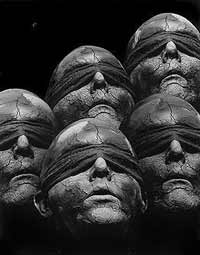The Intelligentsia and its revolutionary mission
By Gaither Stewart

“Things as they are don’t seem to me satisfactory….The world as it is, is unbearable.” (Albert Camus, Caligula, act 1, scene IV)
“What is so bewildering is the conviction—and it is becoming more and more general—that in all the perils that confront us the direction of affairs is given over to a way of thinking that no longer has any understanding of itself. It is like being in a carriage, descending an increasingly precipitous slope, and suddenly realizing there is no coachman on the box.”
(The Russian diplomat- poet Fyodor Tyuchev (1803-1873) in a letter to his wife about the dangerous road ahead toward revolution)
(Rome) I am not an intellectual. But I am an artist and part of the intelligentsia.
WHAT? Not an intellectual! Intelligentsia? What is the difference?
Though most people are vaguely familiar with the word intelligentsia, many confuse it with intellectuals and might be surprised at my claim that I am not of the first but belong to the latter. That distinction is the subject of discussion here—the distinction between uncommitted, if not compromised, intellectuals and the socially committed intelligentsia. That difference is an accusation against the ambivalent situations of many intellectuals in the USA today. That difference can also clarify the positions of educated people in general in all of contemporary Western society.
Since intelligentsia comes to us from the Russian, in research for my recent essays, “Stalin, The Poet, And Life’s Choices” and “The Return of the Proletariat” (www.bestcyrano.org and elsewhere) I studied also the emergence of the intelligentsia in pre-revolutionary Russia and its contribution to the greatest revolution of our times. Most curious are its instructive analogies with and disconcerting divergences from the educated classes in the USA today. The Russian revolutionary example, like Russia itself, is not as distant and exotic as westerners might believe, the Russia that America has propagandized as just another despotic Eastern power.
We should recall that Russia is also the West. It is part of us.
For the great Dostoevsky, Russia is even a far better West, even a better Christendom, for that matter.
At the outset it must be clear that the word, intellectual, does NOT reflect the significance of intelligentsia. Despite dictionary definitions, the two are not the same. For a starter, some intellectuals in our society belong to the intelligentsia. Many do not. For example, pure intellectuals with no pretensions of belonging to the radical intelligentsia occupy the huge and powerful academic world. Therefore, to distinguish between the two one resorts to the transcription of the word from Russian, hopefully to express the true meaning of the latter. Nonetheless, the word intelligentsia too has been internationalized and its meaning at times degraded to banality.
In pre-revolutionary Russia the intelligentsia did not mean a professional part of the population such as writers, academicians, philosophers, sociologists, academicians and educated people in general. Instead it was a social group united by ideas: a similar political direction, philosophy and world outlook. Just read Dostoevsky’s novels and you read novels of the ideas projected by the intelligentsia of then. Historically the word implies radicalism and a desire for drastic socio-political change, a particularly valid consideration for intellectuals in the USA.
The appeal of Marxism to the intelligentsia was and remains a natural process. Marxism contains not only the element of philosophical materialism but also a big and seductive dose of genuine existential philosophy, born from Marx’s German idealism. Faith in the human will. Confidence in human activity by the revolutionary struggle of the classes. The idea that man can overcome the power of (mostly hidden) economic power relations over his life. A positive view of the future.
Hence, the most learned and educated people in society are most certainly NOT to be considered part of the intelligentsia if they are conservative or reactionary. Examples of intellectuals who are not of the radical intelligentsia are numerous, for example the French intellectuals who at the peak of the Revolution morphed into counter-revolutionaries and fled back to the King and his Court rather than risk the perils of the Revolution of the people.
Similarly, modern French intellectuals of the “ideology is dead” school such as Bernard Henri-Lévy and other so-called nouveaux philosophes, made careers debunking intellectual commitment, which is the role of the intelligentsia. After the overthrow of Communism in East Europe the typically facile message of the nouveaux philosophes was that one could no longer take socialist ideas seriously. Lévy said, oh so misguidedly, so maliciously: “When intellectuals let themselves believe in a community of men, they are never far away from barbarism.” Not only reductive but no less than an apology for totalitarianism, of the natural, right wing kind.
Lévy and his intellectual friends became opportunistic journalists. They found easy targets among French committed writers: Sartre had flirted with terrorists of the German Baader-Meinhof Gang and Debray trained in guerrilla warfare in Bolivia with Che Guevara. Jean Paul Sartre, Albert Camus, Régis Debray and also André Gide, despite his flirts with Cold War anti-Communists, were the other side of the moon from the so-called philosophes.
For as always and everywhere post-commitment intellectuals like Lévy find themselves in the blind alley of having to try to justify social injustice. Under the guise of neo-liberal free marketers, conformists coolly tell us that rich countries have no responsibility for problems of the Third World—as if we didn’t all belong to the same world. Given his impeccable credentials as an elegant counter-revolutionary, it should come as no surprise that Henri-Lévy, thick central casting Hollywood French accent and all, is warmly received, some would say fawned upon in the most distinguished precincts of the American media establishment, from the intellectually clueless Charlie Rose to the pseudo-left gnomes at NPR.
Fortunately, many European and Latin American intellectuals have been political and progressive. By force of their commitment they are members of the intelligentsia striving to change the world: such as Sartre and Camus in France. In Latin America Gabriel García Márquez (my journalistic model and master on the positive role of bias), the great writer Ernesto Sábato in Argentina who headed action against the military regime, and Pablo Neruda in Chile who joined the Socialist government of Salvador Allende, belong to the committed intelligentsia, as did the prototype of the man of action, Che Guevara, and certainly Fidel, whose role as a dedicated teacher of the masses, as Mao once saw himself, is also well established. Presidents Chavez and Morales are now following the same route.
To grasp the world of difference between the compromised artistic intellectual and the committed intelligentsia one only needs to compare their role in society with that of powerful, highly placed Jorge Luis Borges who instead supported the military regime in Argentina. Or with the neoliberal Mario Vargas Llosa in Peru, wonderful writer, but considered by many a traitor to his original vocation.
The bulk of America’s academic specialists and economists and the entire rightwing intellectual establishment with its think tanks and foundations do NOT, cannot belong to the intelligentsia. It would be highly imaginative, misleading and false for members of neo-conservative circles to depict themselves as intelligentsia, as used here. For it is the reactionary intellectuals who write those ridiculous, stupid and mendacious political convention speeches and slogans which members of the real intelligentsia find so unbearable. Reactionary intellectuals coin the euphemistic language marked by expressions such as “preponderant intervention”, “preemptive war”, “New World Order”, “collateral damage”, etc., and organize blasphemous functions like national prayer breakfasts, all of which makes the intelligentsia vomit in disgust.
Such “intellectuals” can never be intelligentsia.
No matter how educated they are, no matter their impressive credentials in this or that field and recognition among their own kind, reactionaries are NOT of the intelligentsia, who instead strive for radical social change.
Obviously the distinction I began with is fundamental. Yes, if we want to distinguish between educated people in the image loving, reality show-driven, imitative, poseur society of the USA today and the intelligentsia of positive, forward-looking radical thinkers linked by ideas. For the most part the latter are linked by ideas simply because the impossibility of real and meaningful political action leads them to the development of ideas.
Underlying the intelligentsia’s ideas however—and this is fundamental in the USA today—lurks a revolutionary frame of mind. That mindset is based on an idea, a goal of social justice that though it still dangles out of reach, is a common idea and logical goal: to change the world.
For example, writers and journalists. Are they mere intellectuals as was Borges, or intelligentsia? According to the Russian Communist theorist Georgy Plekhanov, “the belief in art for art’s sake arises when artists and people keenly interested in art are hopelessly out of harmony with their social environment.” Art for art’s sake is the attempt to instill ideal life in one who has no real life. Authoritarian systems rely on compromised writers to portray false images because they fear the truthful portrayal of reality. The compromised writer follows the victors. Conformity and opportunism go hand in hand. The road of the uncommitted intellectual is the middle. He avoids saying what he feels for fear of his place in society. He is aware that many people do not like being told the truth and he is willing to write what he is told people want to hear.
Compromise in journalism and literature leads straight to the banalities of writing—the terrible to-do about petty problems of ordinary existence or in its most degenerated form about the radiant futures of totalitarian societies. The headache of choosing a vacation destination or workers with shining eyes gazing toward the horizon of the future cannot be a substitute for themes like injustice and human suffering.
This is not however to suggest that culture predominates.
There is no doubt that political-economic power calls the shots.
And capitalist Europe, America, Japan, etc., remain capitalist, imperialistic, greedy and avaricious.
The message carried by a common culture of social change contrasts with the message of economic gain and political power. Culture’s message must be social, inquisitive, critical, often calling people to arms for resistance. In this sense, at certain times of societal evolution, literature can be more important than economics and politics, and religion too, for that matter.
I could have ended this essay here. The significant part has been said. Yet, since the goal I am speaking of is radical change I still want to underline the analogy between the American and European intelligentsia and the pre-revolutionary atmosphere in Tsarist Russia.
What? Russia again? Another futile historical reflection? Another wasted “intellectual” retrospect?
No, I don’t think so. Because America today stands on the threshold—maybe on the precipice—of an explosive situation in which the appearance of a new version of the proletariat now formed by wage earners and crossovers from the impoverished, zombie middle class points toward the inevitable emergence of a new political movement. That virgin movement needs new ideas. It badly needs ideas and guidance, today. For this objective, this goal, is no longer some theoretical political Ultima Thule. This is an Alamo for America.
The American intelligentsia represented by the editors of publications like the one that published this article originally (Cyrano’s Journal Online) and by a growing number of like-minded persons are still too few in the vast nonsense and ignorance of real America. No wonder the American intelligentsia’s oppressive feeling of isolation. As in pre-revolutionary Russia, also the radical American intelligentsia speaks of itself as “we” and of state authority as “they.” No wonder its loneliness, as if living among people who no longer understand its language. No wonder the feeling of comradery among us. And no wonder the hint of a kind of monastic order about the American radical intelligentsia, its different life style and behavior and its ability to see through the gossamer manifestations of the capitalist society in which it lives. No wonder the radical’s difficulties inside real society moving in the wrong direction!
And no wonder the more sensitive uncommitted intellectual feels superfluous in the presence of the committed intelligentsia.
This is not to deny that the intelligentsia has its grave faults, inconsistencies, stupidities. The intelligentsia’s outsider complex is in fact counter-productive and a-historical.
There is an elusive word that describes the situation and mood I have in mind. It’s in a song. Or in a poem. It’s on the tip of my tongue. The word might describe who we are. I begin to recall. There is a Dominican song. Buscando…? Buscando visa para un sueño. Searching for a visa to a dream. A reason for being. Searching for a visa.
The intelligentsia desires that visa in order to arrive, and not remain excluded, isolated, lonely. It wants to participate, to be part of the main. Even if the main is on a false course toward the rocks and shipwreck. We instead live as strangers in a foreign land. But we hope to find the way back, for we miss America. That visa opens new horizons.
The chance reader only has to open his mind in order to see the real world with new eyes. To see that it is not a world to conquer militarily. It is a world to join. An entire world marked by humanness. As has been said before the intelligentsia cannot forget that sometimes it’s necessary to steep oneself in the non-intelligence of the world. For unlike the intellectual class of educated specialists, the intelligentsia is formed by various social classes, not by castes nor a common social or economic status. As the Russian philosopher Nicolas Berdyaev remarked about the intelligentsia, “By definition it stands for a break with the classification of everything according to categories.”
So now that we have defined it, praised it, and lamented its loneliness and even inadequacies, what does all this mean for us? Intellectuals? Intelligentsia?
It comes down to a question of roles. The American intelligentsia asks, What is to be done? That same question was posed by the Russian intelligentsia in the suffocating society of 19th century Russia so reminiscent of today’s America.
I keep returning to the Russian example because just as the intelligentsia in pre-revolutionary Russia set its stamp on the development of the idea of Socialism there (after all, making the greatest revolution of modern times!), we believe that when the propitious moment arrives, when what was inexpressible becomes expressible, when events have created a universal mood of revolutionary discontent with the existing system, when tensions reach the boiling point, the American intelligentsia, together with the American wage earners and the ever vaster, ever multiplying, ever angrier and, one hopes, awakened middle class, will rise against the capitalist system and salvage the positive parts of America and bring about radical change.
Change is a word that both the intelligentsia and intellectuals of America should be discussing together. What kind of change do they mean? Intellectuals mean one thing. Usually reform. The intelligentsia means another. Radical change. It’s an unfortunate paradox that the intelligentsia doesn’t always know what exactly to do with pure intelligence.
The change is not the change promised in electoral campaigns, not the change written on the little cards held in the hands of backers of one candidate or the other. The goal has to be the radical transformation of the entire society. The idea of change right now is so potent that even the establishment’s figureheads, Obama and McCain, are brawling to own the “brand”.
The American intelligentsia might keep in mind one comforting thought: of major world countries today perhaps only America is still economically self-contained and self-sufficient enough to support and survive the upheavals of a new social revolution.
The great historical contradiction however is that in no other country is real capitalism so strong and the positive idea of Socialism so weak as in the United States of America, which in turn has made Socialism so difficult to achieve elsewhere.
So the quandary for the American intelligentsia is: What is to be done? Or, What can be done? For to our great misfortune—even if the American intelligentsia-radical Left had the means to address the rising wage earner-middle class coalition—what message would it send to them, the new masses?
A hard, brutal truth is that there is precious little to admire, little to address, in that growing class of the neo-proletariat marked by drabness and mediocrity, physical obese ugliness, monotony and mental laziness and cultivated ignorance and its anti-historical cult of non-memory, a class waiting almost obsessively to be entertained.
Par example: Have American people gone crazy to even consider the theatrical vulgarity of the ridiculous candidacy of a redneck racist warmonger like Sarah Palin as Vice President and possible President of the USA, recalling Roman Emperor Caligula’s mad idea of naming his favorite horse, Incitatus—or Galloper—as Consul of the empire? Has everyone gone mad?
As an American I am offended by the idea. Have Americans morphed into the peoples of ancient decadent Rome? Peoples who for distraction relied on the blood and sand of the arenas of the coliseums across the empire. Where are we to find a model of a political and cultural ideal that could appeal to such a trampled-on lot who have been expertly trained to despise anyone or anything different from them and their “values” and the “American-way-of-life”?
With the reality in mind that it is precisely that ragged, disinterested American proletariat-middle class that must execute the radical change, the American intelligentsia, just as in pre-revolutionary Russia, truly has just cause to wonder: What is to be done?
In the United States the official reaction to the “Communist threat” corrupted generations of Americans and was the justification of the advent of official amorality in a virgin America that still considered itself pristine. In the Cold War any subterfuge was licit. In the Cold War the lie was good. Four decades of the great lie of anti-Communism sufficed to generate a new morality in America. A morality of evil that filtered down into society. It has nothing to do with ideas or ideology; only power. It is a way of viewing the world, pursued and confirmed by a great slice of the country’s intellectuals. A cold manner, amoral and immoral at the same time. This evil power is an American spirit, an evil spirit that has perhaps always lurked in America. For as we now know America was never innocent. At the best, only naive. Evil lurked in the Blue Ridge Mountains of my boyhood. Evil still lurks in fundamentalist America.
Yet, at the same time the American nation has been duped, wants to be duped, by the great lie of the “Communist threat.” The subsequent creation of terrorism and fear was the natural course of things.
Addendum: I confess that I’m not totally satisfied with the word intelligentsia. I welcome suggestions for a better word, a modern word that describes that dynamic but minute, unhappy, isolated and lonely part of American society today that so desires dramatic, drastic, radical, revolutionary change.
The Personal Manifesto of a member of the intelligentsia
- I am not objective, as true objectivity is a myth. Nor impartial, which is about the same. I have no desire to be unbiased. And God forbid that I ever become non-partisan—oh, that ugly hyphened word! Just that hyphen alone is enough to make me partisan.
- Traditionally journalists are supposed to be objective and impartial. But who said so? My answer is that I can be as partial and subjective as I please. As necessary. For that matter, most journalists do the same anyway, though they disguise their partiality in nice little euphemisms. [For most in the media, and the public, the mere fact of working for a commercial newspaper or tv station constitutes de facto proof of being a "professional."]
- As the great Gabriel García Márquez taught his journalism students, above all you must learn to be partial. Forget rules about impartiality and reliance on facts laid down by the little men. Balls! Screw the reliance on facts. Those incontrovertible facts! An obsession with facts creates small-minded people. All our lives they hit us over the head with them. When someone says ‘Let’s get down to brass tacks’ or ‘the facts are’, it’s time to watch out. So two plus two is four! As if only things that happen or allegedly happen are worthwhile! Facts obscure the real truth. We read mountains of facts and believe we know what is happening but we still know nothing about the center of things, the core truths.
- No honest journalist-writer can allow himself to be unbiased and objective. After all, few of us are academics.
- Besides, impartial to what? To lies? To rampant hypocrisy? To swindles? What is there about which we should be impartial unless it’s those hateful facts? As if we should be impartial to and have no opinion about the fictional facts that created wars in Afghanistan and Iraq, that pave the way to war against Iran, that crushed Serbia and created Kosovo, that lead to the ranting and raving—oh, those facts!—against Chávez in Venezuela, that support lists of rogue nations and terrorist movements such as Hamas and Hizbollah. Should we be impartial to the men and institutions—like Wall Street and its minions deeply embedded in government, often indistinguishable from the political class—that have given us repeated recessions and depressions in our history, gutted and mismanaged the American economy to fit their own agendas, created a reign of deepening economic and social inequality, and that now, in 2008, threaten to crown their high-handed thievery with a mugging of the US taxpayer to the tune of trillions of dollars?
It is surely a question of the chalk circle of the masses that Power cultivates. No one should step outside it. There is no need for genetic or biologic cloning,
As Baudrillard reminds us, the individual is already cloned culturally and mentally … by them. We feel it around us everyday just living in our society. Power wants more of it; the cloned man is easy to control.
The individual is something else.
We do not reject the idea of the whole individual that cannot be further divided. Yet, we want to be similar to our fellow humans, a social animal, but, still different, more than a reduced size copy of other humans. Individuality? Yes, but not at the cost of elimination of others.
Viva bias!
Based in Rome, Gaither Stewart is Cyrano’s Journal Online’s European Correspondent. A seasoned journalist and critic, his essays and reports have been published by scores of leading sites and print media around the world.
Subscribe to Pravda.Ru Telegram channel, Facebook, RSS!




